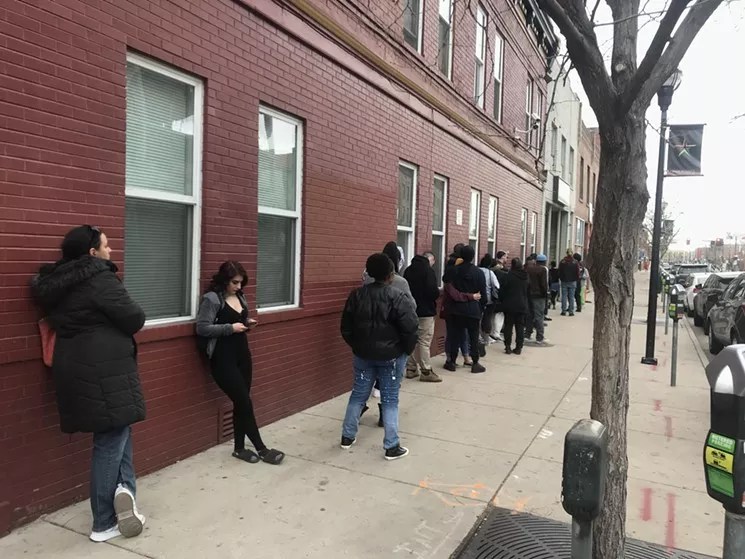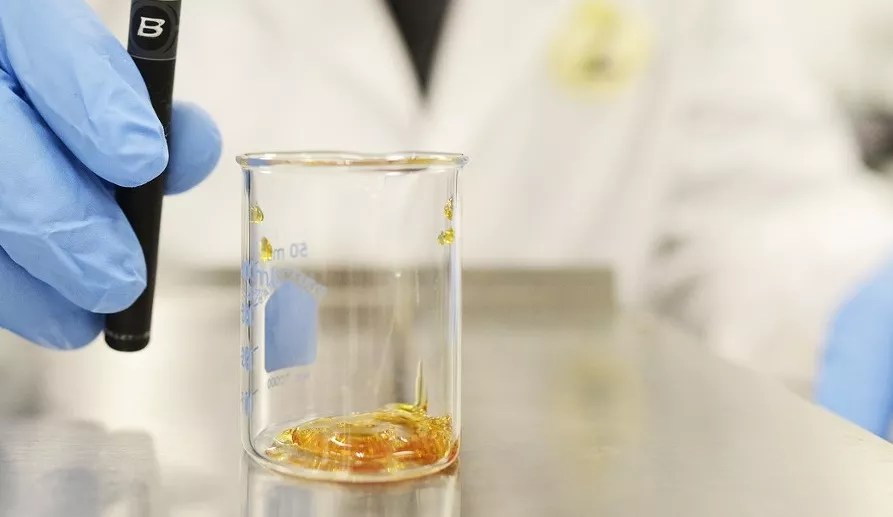
Unsplash/Josh Duke

Audio By Carbonatix
Colorado’s decade-long experiment with marijuana legalization has gone relatively well, but it hasn’t all been sweetness and light. This was the first state to give legal cannabis a try, after all, and with that status comes surprises, tension and unintended consequences.
Shady business operators, overzealous lawmakers and edibles overindulgence have all given legal cannabis a black eye from time to time. Here are five moments that almost drove the state into reefer madness:

Photos of commercial plants riddled with mites and mold first surfaced in July 2017.
Denver Department of Environmental Health
Pesticides and Mold
The first thing to harsh Colorado’s buzz on legal weed was news that several large growing operations had come under review for using potentially toxic pesticides. Recalls began trickling out of the state Marijuana Enforcement Division in 2015, and they soon became a flood as Colorado created a set of rules and restrictions for pesticide use. Over the years, the MED has issued dozens of recalls for contaminated cannabis – including one this month for nearly 200 harvest batches of pot – and those health notices now flag a lot more than sketchy pesticides.
Moldy cannabis wasn’t on the radar of regulators at the dawn of retail legalization, but it’s since surpassed pesticides as the leading cause of commercial pot recalls. Not only are there worries about the level of mold and yeast inside grows, but there are also concerns about shady practices used to pass lab testing, as well as steps down the packaging and storage roads that could inadvertently result in further contamination, as shown by a round of Denver Department of Public Health and Environment investigations that led to 20 out of 25 dispensaries failing mold and yeast testing in 2019. Since then, heavy metals and water activity have also contributed to recalled products.

Flickr/Artizone
Maureen Dowd Dunks on Edibles
Stories of edible freakouts suffered by new cannabis eaters popped up frequently in the months following the opening of recreational stores. Reports of accidental ingestion by children and pets and two deaths potentially linked to edibles shone a light on a real problem: People didn’t know how to eat weed. Still, the moment all of this received real national attention came courtesy of Maureen Dowd. The New York Times columnist bought a candy bar with 100 milligrams of THC from a Denver dispensary in 2014. After apparently receiving no dosage instructions from her budtender or product packaging, Dowd ate too much and, well.,.let’s let her describe what happened next:
Sitting in my hotel room in Denver, I nibbled off the end and then, when nothing happened, nibbled some more… For an hour, I felt nothing… But then I felt a scary shudder go through my body and brain. I barely made it from the desk to the bed, where I lay curled up in a hallucinatory state for the next eight hours. I was thirsty but couldn’t move to get water. Or even turn off the lights. I was panting and paranoid, sure that when the room-service waiter knocked and I didn’t answer, he’d call the police and have me arrested for being unable to handle my candy.
Dowd’s article may have been a little overly colorful. Hallucinations on weed? Come on. But it put pressure on Colorado to address the lack of directions on commercial pot edibles. That same year, the state implemented rules requiring that all edibles be metered into 10-milligram doses and packaged with ingestion instructions. Since then, the freakouts have largely been needless trips to the emergency room by rookies, and edibles companies are still complaining about packaging rules.

Jeff Sessions has a long list of marijuana fuckery, and it all came to a head in 2018.
Shutterstock.com/markreinstein
Jeff Sessions’s Short Crusade
Jeff Sessions’s stint as United States Attorney General didn’t end up in the top ten of the Trump administration’s most batshit-crazy moments, but it was a real recent threat to legal marijuana. Sessions had a long history of hating the plant. In the ’80s, he’d said that he thought members of the Ku Klux Klan “were okay until I found out they smoked pot.” That didn’t stop Trump from appointing Sessions to AG in 2017, however, and that’s when the real madness began.
In less than two years before he was canned by Trump, Sessions delayed federally approved medical marijuana research, equated marijuana consumption with opioid abuse, and sent letters to states that had legalized pot expressing his concern and disapproval. But the real bomb dropped in his first month on the job in 2018, when Sessions revoked the Cole Memorandum and nine years’ worth of protective federal guidelines for state-compliant marijuana businesses and users. It ultimately resulted in virtually nothing, and marijuana legalization (and commercialization) continues to spread. But for a few months, Colorado’s marijuana industry was more than concerned about what an empowered Sessions could do to the legalization movement.

Marijuana users flocked to dispensaries on March 23, 2020, after hearing that the city planned to shut down pot shops for two weeks.
Thomas Mitchell
Denver’s Almost-Prohibition
Where were you during Denver’s almost-prohibition? As part of a citywide stay-at-home order to limit the spread of COVID-19, Mayor Michael Hancock’s administration announced on March 23, 2020, that recreational dispensaries and liquor stores would be among the businesses that would close that day. The move, intended to prevent large gatherings of people for the next two weeks at a minimum, immediately did the opposite, with swarms of panicking Denverites lining up at pot shops and liquor stores before the 5 p.m. shutdown.
Hancock clarified his order within hours, but it was too late to stop the rush: Dispensary sales shot up 392 percent from noon to 4 p.m. on March 23, almost quadrupling the average afternoon sales rate for a Monday in 2020. We laugh about it now – and even wear T-shirts, in some cases – but people were on the cusp of taking matters into their own hands had the order stayed.

Concentrated THC oils have become targets of potency-limit efforts.
Scott Lentz
Potency Cap Push
Marijuana legalization has gone too far to rewind in Colorado, but there has been a recent push by several groups to limit the potency of certain dispensary products. The new target of anti-marijuana and youth prevention groups is THC potency, and it almost came under limits in Colorado last year. A bill draft leaked from the Colorado Legislature would have banned any form of legal marijuana, recreational or medical, testing over 15 percent THC, as well as marijuana suppositories, flavored vaporizer products, inhalers and other pot products. The bill never passed, but lawmakers did enact an extensive set of restrictions on medical marijuana and limits on how much marijuana concentrate dispensary customers can buy. The potency debate isn’t in the graveyard yet, however, and could return to Colorado at some point.